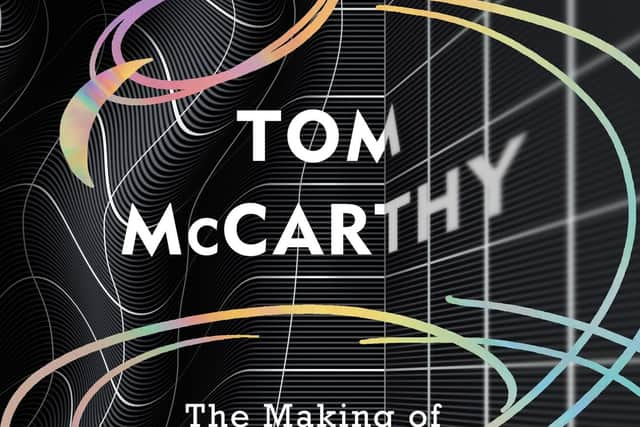Book review: The Making Of Incarnation, by Tom McCarthy


If you like your novels to be about exquisite dinner parties in affluent suburbs with an amuse-bouche of marital infidelity, I would not recommend the work of Tom McCarthy to you. He is, however, in my opinion, one of the most brilliantly intellectual novelists of the moment. That is not to say his work lacks emotion. In some ways, he is far more engaged in trying to understand what it means to be human than any pre-packaged purveyor of social mores.
The Making Of Incarnation is like a ghost-written hybrid of a John le Carré thriller, the postmodern philosophy of Jacques Derrida and a sci-fi romp all at the same time. To use Hitchcock’s term, the McGuffin here is Box 808. It relates to a woman named Lillian Gilbreth, who pioneered “solid light tracks” for time and motion studies. At one level this is about the choreography of the human body; at another it is – since the studies involve production lines – a horrific vision of how to make humans more efficient, or rather, more like robots. A researcher into the Gilbreth archive discovers that Box 808 is missing, and that just prior to that Lillian had been in contact with a Soviet scientist interested in the same field. Mark Phocan is an expert in CGI technology, although he is less concerned with how it is used than the underlying systems and ways of capturing data, and in a convolution in a novel full of convolutions, is tasked with finding the enigmatic Box 808. That is, while also working on an upcoming movie called Incarnation, with some wonderful comedy about getting the physics right about a sex scene in zero gravity. Of course, there are other parties equally keen to know the contents of Box 808. That the film is called Incarnation is worth noticing, since the whole novel is about how we are embodied, made flesh, trapped in skin.
Advertisement
Hide AdMany of the themes here have already been present in McCarthy’s work. He first was acclaimed for Remainder, in which an amnesiac man sets up elaborate repetitions of the one memory he has. C was shortlisted for the Booker Prize, and I think ought to have won it, and scanned across technologies from the telephone to séances in looking into how we actually communicate. His previous novel, Satin Island, was obsessed with detritus, and the flow-systems of how we discard. That these themes are here in The Making Of Incarnation is no surprise – there is even a reprise of his fascination with the fire-signals at the beginning of the Oresteia by Aeschylus – but it is markedly more light.


This might be because the descriptions of the yet-to-be-completed movie are very funny indeed, but McCarthy doesn’t do funny without serious import. It reads like a parody of Star Wars or Flash Gordon, with a loveable rogue and a haughty princess, and sending these tropes up, McCarthy shows how all these stories contain their own precedents. There is nothing new under the sun, so we have iterations of iterations of iterations. But it does allow him to deploy made-up sci-fi words that the reader can decode – a horde of leperosi for example or kjarabancs - and be slyly satirical about the whole genre. The same applies with the wild goose chase about a box that possibly could “change everything” or equally might be empty.
McCarthy has, in the old sense of the word, wit. One of the other players states that “in my own state of addled dotage” he now believes “the great contraptions we come up with, all the engines and the interfaces and the operating codes – that they are nothing more than prompts for our own supposition and projection… Jacquard looms, the Internet, crack-pot time travelling patents or those influencing engines sketched by a generation of psychotics: whether they get made or simply trawled up from the depths of some delusion is beside the point. All machines are imaginary”. Into this is folded (one of the novel’s favourite words, alongside vortex) a huge amount of detail and a simple truth.
This is a work about artificial intelligence and its artifice. When discussing computer football games, one character discussed whether they can ever model “micro-events”. Does a Catholic player praying before a match make a material difference to the outcome? Although there is a degree of nihilism in McCarthy’s thinking – the sci-fi story includes “fatalistic conviction”, “drive on through depletion and stagnation”, “the void called them, and they came” – this pure attention to how much bigger humans are on the inside marks him as a humanist author rather than a despairing wonderer at the wheels within wheels, and circles within circles and churns within whirlpools within flows. There is something uplifting about McCarthy’s work. He makes you think and he makes you think things you hadn’t thought before, in stark opposition to the bourgeois novel of manners.
I once interviewed McCarthy for the Edinburgh Book Festival and he suggested that the next year, we should just read out the published transcript of last year’s event. That seems to encapsulate both the cleverness and the prankishness of this most intriguing of contemporary writers.
The Making Of Incarnation, by Tom McCarthy, Jonathan Cape, £16.99
A message from the Editor:
Advertisement
Hide AdThank you for reading this article. We're more reliant on your support than ever as the shift in consumer habits brought about by coronavirus impacts our advertisers.
If you haven't already, please consider supporting our trusted, fact-checked journalism by taking out a digital subscription at https://www.scotsman.com/subscriptions